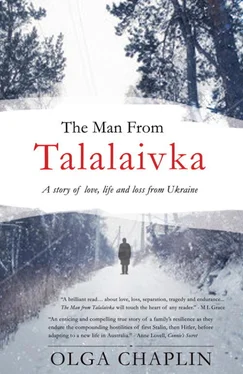“Vanya, Vanya… son, you must come back immediately with me… there is no time to lose. The partisans are all over this area. There will be fighting any time now. Vanya, you can’t stay here. It’s too dangerous now. You must return with me!” Peter’s hoarse whisper broke. He gripped his son in a desperate attempt to persuade him. In the flickering miniscule candlelight, he could just make out Vanya’s hollow-eyed appearance, despite his youthful defiance. He knew that look of inner despair. His son, too, was torn in his loyalties: to his country, to his family, to his loved ones.
Heart hurting despite his self-control, Peter held onto his son. In that flash moment, he realised Vanya was his last link to his own first love, to his deceased infant son, and to his own idealism of life under Lenin’s modified utopia, before the cruelty and madness of the Stalin regime took hold over every part of their lives. He wanted desperately to hold onto his last soul connection with the unblemished love of life that his own youthful mind had so embraced. He realised, at that moment, that finding Vanya, and pleading with his son to stay with him, meant more to him than the possibility of that stray bullet from a partisan’s rifle. Already, his heart was being torn open by Vanya’s hesitation, his uncertainty.
Eyes downcast, Vanya avoided his father’s pleading stance. He was lost for words, his natural shyness endearing him even more to Peter. “Tato, don’t worry for me… Kysma will be coming soon. He wants me near him… Please tell mother not to worry for me. I will be all right.” Defiant but respectful, not yet a man at sixteen, he was making a man’s decision to remain behind. Peter felt immobilised, the pain jabbing him within. In the urgency of the situation he had not prepared himself for this, was stunned at Vanya’s resolve. He held him close to him, embracing, willing him to safety. “Come back to us, back home, my dear son,” he pleaded gently, one last time.
He could do no more but to return to the relative safety of the kolkhoz farmhouse, protect his remaining little family as best he could. Whichever way he turned, the situation was precarious. Propaganda from both adversarial armies was now at fever pitch. The partisans, ever more confident by the day, trigger-happy and nervous, and increasingly distrustful of villagers who had harboured the German menace in these parts, had ‘shoot to kill’ orders from advance groups of the Russian army, and to speedily bring the Ukrainians back under Stalin’s control. His ‘scorched earth’ policy had left the Ukraine barren, its people at the mercy of Hitler and his armies. Now, they were once more pawns in the struggle between the two tyrants: a struggle to the end. There was no knowing what would become of Vanya now.

Chapter 25
In pre-dawn darkness a German soldier threw open the farmhouse door. “Achtung, achtung!” he called out to the sleeping families. More soldiers positioned themselves, grim-faced, rifles ready. The German captain took charge. “Attention, everyone. We are evacuating. Put on warm clothes. Put on your coats. No luggage… I repeat, no luggage. One bundle of clothing for each family allowed. That is all. Hurry! We move immediately!” He approached the shaken elders of the farmhouse, nodded to them. “Return to your bed. You will stay.” Peter guessed, correctly, that the area commandant had been anticipating this and readied his area for this urgent evacuation and retreat. The commandant had good reason to act so quickly. The katyshka-like bombs were more frequent, aiming closer to his quarters. In the quiet panic of the farmhouse, Peter whispered to Evdokia, reassured her, helped dress the children.
“Hurry, hurry!” an anxious German soldier on horseback, rifle pointing, commanded the farmhouse occupants to waiting wagons, then Peter was ordered to lead. He grasped the horse’s reins, checked his wife and children were securely beside him. The captain signalled to move. Evdokia, with little time to think, felt for the tiny photograph of little Manya she had slipped inside her rough work shirt, close to her heart. It would stay there, hidden for protection for an indeterminate time, before it would see safety again.
Another bomb blast, followed by a volley of machine-gun fire from Russian artillery, burst through the dawn air in the direction of the eastern fields, the woods and the hill. It was highly likely the Russian army’s advance party had linked up with the partisans, and was preparing for a major attack. The German soldiers must have known this, hence their nervousness. They were short of supplies, and even shorter of ammunition, despite their menacing and deadly rifles. The rumours whispered these past days were true: under Marshal Zhukov’s brilliant direction, Rokossovsky’s central east army was pushing relentlessly towards Kiev, re-occupying village after village, railway after railway, at breakneck speed. Even at the fast pace they were pushing their horses, on the captain’s orders, it would be a miracle, now, if this small convoy arrived at Talalaivka railway station before it, too, was destroyed by Stalin’s air fire, which did not distinguish captives from captors.
Peter glanced towards Kysma’s kolkhoz farmhouse, close to the woods, close to the area of threat and destruction. It showed no signs of life. He prayed that Kysma and his family, and Vanya, were safe and perhaps even heading in the same direction, towards Talalaivka. He turned to look back one last time in that early dawn, as their kolkhoz farmhouse, which had been their home for these past dozen years, receded from view. Now, only their memories remained. They were forced to leave all else. Most of all, they were forced to leave their Ukrainian heritage, their Ukrainian soil. It was a double punishment: forced to leave at gunpoint, forced to give up what they cherished most in life.
The early morning sun warmed them. Peter gauged they could not be far from Talalaivka. Suddenly, the convoy stopped, on orders from the captain. The wagons forked their way around a nearby wood. They were ordered to look ahead, on pain of reprisal. It was too late. The smouldering remains of a burnt-out village, its smoke permeating the pure morning air, warned them. But not enough. Not even the acrid smoke could hide the stench of human carnage nearby. In a clearing, at a short distance from them, exposed to passers-by as a warning, was a mass grave. Hitler and his henchmen, as vindictive in retreat as they were in the initial invasion of the Ukraine, had urged such carnage and destruction so that little could be left for either Ukrainians or Stalin’s regime. Peter grasped Evdokia’s hand, tried to warn her, too late. In those few moments she, too, could see the open mass grave in the field beyond the trees, the stench confirming this execution massacre. Peter knew this was the shocking reprisal for disobedience. The retreating German army needed little excuse for such horror: partisan activity, or even support, was enough to trigger a vengeful response such as this: the consequent horrific, collective end.
Evdokia blinked and gasped involuntarily at the horror, her eyes wanted to deceive her, but could not. She shuddered, the early Ukrainian morning sun unable to warm her. All those many, many bodies: so many innocent men, women and children paying the ultimate price for simply being in their own homeland, caught between two tyrants’ armies. Her tears of sorrow for these hapless innocents blurred her vision, as she held tiny Nadia and little Mykola closer to her. She felt helpless in those sickening moments of discovery and realisation. She could not imagine the last moments of those victims, lying on the warm bodies of their compatriots, some finding within them the comfort of words to whisper to the already dead and dying, before they, too, would suffer the same fate moments later. How many “Hospode pomelyue” were whispered; how many “Requium in pachem”, “Borach dayan haemet” were whispered to their Maker that day.
Читать дальше













